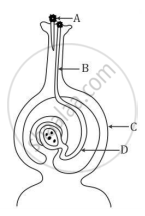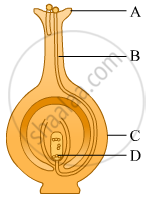Advertisements
Advertisements
प्रश्न
Observe the figure below. Write functions of the labelled parts.

उत्तर
- Gynoecium (Carpel): It is an essential whorl. It is consists of stigma, style and ovary. It acts as a female reproductive part of the flower. It is responsible for the production of female gametes.
- Androecium (Stamen): It is an essential whorl. It is consists of anther and filament. It acts as a male reproductive part of the flower. It is responsible for the production of male gametes.
- Calyx and corolla: Calyx and corolla are accessory whorls. They are responsible for the protection of inner (essential) whorls.
- Pedicel: Pedicel is a small stalk which supports the flower.
APPEARS IN
संबंधित प्रश्न
Name the parts labelled as A, B, C and D in the diagram given below:-

Answer the following question.
What is pollination? Explain the different types of pollination.
In the following diagram showing the structure of embryo of a dicot seed, what are the parts marked I, II and III sequentially?

Name and differentiate between the two modes of pollination in flowering plants.
A student identified the various parts of an embryo of a gram seed and listed them as given below :
(I) Testa
(II) Plumule
(III) Radicle
(IV) Cotyledon
(V) Tegmen
Out of these the actual parts of the embryo are :
(A) I, II, III
(B) II, III, IV
(C) III, IV, V
(D) II, IV, V
You are asked by your teacher to study the different parts of an embryo of a gram seed. Given below are the steps to be followed for the experiment:
I. Soak the gram seeds in plain water and keep them overnight.
II. Cut open a soaked seed and observe its different parts.
III. Take some dry gram seeds in a petri dish.
IV. Drain the excess water.
V. Cover the soaked seeds with a wet cotton cloth and leave them for a day.
The correct sequence of these steps is :
(A) III, I, V, IV, II
(B) III, I, II, IV, V
(C) III, IV, V, I, II
(D) III, I, IV, V, II
Write the names of those parts of a flower which serve the same function as the following do in the animals :
(i) testis,
(ii) sperm,
(iii) ovary,
(iv) egg
Sketch the reproductive parts of a flower.
The process of fusion of the male and female gametes is called ______.
Where are a plant's sex organs located?
What are the reproductive organs in a flower?
Fill in the following blank with suitable word :
The male organ of reproduction in the flower is the.......... .
Explain the terms 'cross-pollination'?
Explain the term 'fertilisation'.
Name the part of a seed which grows into shoot.
(a) Draw a neat diagram of a flower showing its various parts. In this diagram mark stem, receptacle, sepals, petals, stamen and carpel.
(b) What name is given to (i) all the petals of a flower, and (ii) all the sepals of a flower?
(c) What are (i) stamen, and (ii) carpel, in a flower?
(d) What is the other name of carpel of a flower?
(e) What is the name of yellow powdery substance present in the anther of a flower?
In the figure given alongside, the parts marked A, B and C are sequentially :
(a) cotyledon, plumule and radicle
(b) plumule, radicle and cotyledon
(c) plumule, cotyledon and radicle
(d) radicle, cotyledon and plumule
Fill in the blank:
Seeds are formed from________.
State whether the following statement is true (T) or false (F):
Flowers which possess stamens and carpel are called unisexual.
Mention the function of Flower.
You have to perform the experiment, "To identify the different parts of an embryo of a gram seed." Describe the procedure that you would follow.
The students of a class were asked by the teacher to study the different parts of an embryo of an angiosperm. Given below are the essential steps for the experiment :
A. Soak the seeds in plain water and keep them overnight.
B. Cut open the soaked seed and observe its different parts.
C. Take some healthy seeds in a petri-dish.
D. Drain the excess water, cover the seeds with a wet cotton cloth and leave them as it is for a day.
The correct sequence of these steps is
(a) C, A, D, B
(b) C, D, A, B
(c) A, C, D, B
(d) A, C, B, D
Identify A, B, C and D in the given diagram and write their names.
A student is asked to study the different parts of an embryo of pea seeds. Given below are the essential steps for the experiment :
(I) Soak the pea seeds in plain water and keep them overnight.
(II) Cut open the soaked seed and observe its different parts.
(III) Take some pea seeds in a petri dish.
(IV) Drain the excess water. Cover the seeds with a wet cotton cloth and leave them as it is for a day.
The correct sequence of these steps is
(A) III, I, IV, II
(B) III, IV, I, II
(C) III, I, II, IV
(D) III, II, I, IV
“Cell division is a type of reproduction in unicellular organism.” Justify.
Explain sexual reproduction in plants.
Prepare a slogan for campaign against female foeticide.
What is meant by pollination?
Answer the following question.
List two agents of pollination?
Accessory whorls : Calyx and corolla : : essential whorls : ______________
What does germination mean?
Give scientific reason.
Flower is a structural unit of sexual reproduction in plants.
Explain the sexual reproduction process in plants with a diagram.
Where does the endothecium layer of anther lobes is present?
Length of pollen tube depends on the distance between ______
In a bisexual flower inspite of the young stamens being removed artificially, the flower produces fruit. Provide a suitable explanation for the above situation.
Triple fusion involves ______.
In flowering plants, the pollen grains are transferred to stigma by pollination but the female germ cells are present in the ovary.
Explain with the help of a labelled diagram (only concerned parts), how the male germ cell reaches the ovary.
Given below is a diagram of a germinating seed. Label the parts that:
- gives rise to future shoot.
- gives rise to future root system.
- stores food.

